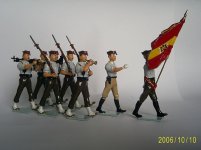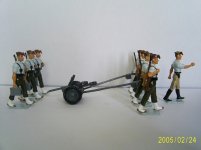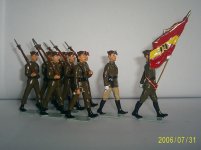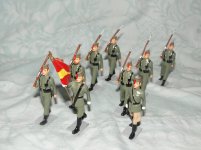ucla1967
Major
- Joined
- Jan 28, 2006
- Messages
- 6,752
The Hiriart 40 set Spanish Civil War catalog has three sets of the Spanish Foreign Legion, two of which are also found in the 354 set regular catalog. The Spanish Foreign Legion was a combat harded unit which was serving in Spanish Morocco when the war broke out. It was founded in 1920 and saw service in the Riff War of 1920-25. Only about 10 percent of its members were foreigners; the balance were Spaniards. General (then Major) Francisco Franco was second-in-command to its founder, Colonel Millan Astry. By 1936, the Legion was considered an elite fighting unit which comprised six Banderas (battalions); by the end of the war in 1939, they had grown to 18 Banderas and an armored unit.
The first set is ES-09 LEGIONARIOS DEL TERCIO which shows the legionarios in their summer uniforms. This is also in the regular catalog as Set 1208. Note the three man Hotchkiss macine gun crew.
The first set is ES-09 LEGIONARIOS DEL TERCIO which shows the legionarios in their summer uniforms. This is also in the regular catalog as Set 1208. Note the three man Hotchkiss macine gun crew.





